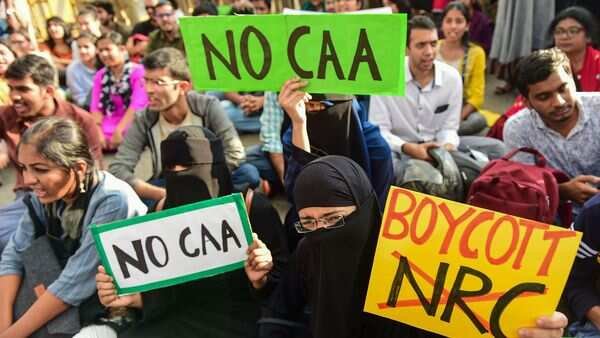In a case related to Shaheen Bagh sit-in on a small stretch of a road in New Delhi, a Supreme Court verdict said that public protests must be “in designated areas alone” and “public ways and public spaces cannot be occupied, and that too indefinitely.” The reason stated was ‘inconvenience to commuters.’
The debate resurfaced once again on the issue when Hon. SC did not allow the plea to remove protesting farmers from arterial roads of Delhi and allowed to continue ‘peaceful’ protest. A bench headed by Hon. CJI A. S. Bobde, univocally granted primacy to the right of protest against State policies and refused to sway with the argument of ‘public inconvenience to commute.”
The Shaheen Bagh sit-in (December 2019-March 2020) was necessitated to protest the “Citizenship (Amendment) Act (CAA).” During the discussions on the bill in the Parliament, the ‘chronology’ stated by UHM indicated the intention to follow an Assam-like exercise to create the National Register of Citizens (NRC). It was repeatedly said that those who failed to establish their nationality (by proving Indian citizenship of their parents) shall be held as ‘illegal migrants’ and ‘thrown out’. This created fear especially in the Muslim Community because CAA is biased against them. The law provides Indian Citizenship for the migrants barring Muslims from neighbouring countries. To express their anguish, local women started peacefully sitting in on a small stretch of a subsidiary road at Shaheen Bagh. It was replicated at several other locations in the city and outside.
That was first major voice of dissent against the NDA Government. Now farmers are protesting in a big way against three new farm laws. A reading of CAA and laws relating to agriculture makes it clear that constitutional priorities and public interest have been overlooked in all these laws.
SHAHEEN BAGH VERDICT
In a case filed against Shaheen Bagh sit-in, an SC verdict (7 October) delivered six months after the suspensions of sit-ins due to COVID-19, laid down several restrictions which are feared to suppress people’s right to protest government actions.
The verdict said, “Democracy and dissent go hand in hand, but then the demonstrations expressing dissent have to be in designated places alone. The present case was not even one of the protests taking place in an undesignated area, but was a blockage of a public way which caused grave inconvenience to commuters. We cannot accept the plea of the applicants that an indeterminable number of people can assemble whenever they choose to protest.”
Obviously this will strengthen the hands of the administration which already tends to follow majoritarian instinct and deviate from the democratic norms. The rights under Articles 19(1)(a) and (b) – freedom of expression and the freedom to assemble peacefully – can be suppressed as in the opinion of the court ‘public order’ has priority. However, it seems erroneous to imply ‘convenience of commuters’ as ‘public order’. As amended in Article 19, the expression ‘public order’ connotes the sense of ‘public peace, safety, and tranquillity.’ The recent observation of SC bench headed by Hon. CJI also amply clears it in the case against farmers’ sit-in on various entry points to Delhi.
The bench observed, “There can certainly be no impediment in the exercise of such rights (Rights to protest and expression) as long as it is non-violent and does not result in damage to the life and properties of another citizen.” Hon. CJI was responding to Senior Advocate Mr. Harish Salve’s argument, “The fundamental right to protest cannot extend to holding a city to ransom,” during a hearing on December 17. He urged the Supreme Court to lay down the contours of the right to protest.
This SC order (December 17) also restricts Police to use violence to remove the ‘peaceful’ protesters from public spaces and roads. The highways used in farmers’ protests are not of lesser importance than the Shaheen Bagh stretch. Had the police not blocked parallel roads and UP Police at a point some two kilometres from Shaheen Bagh sit-in, the flow of traffic would not have hampered.
As reported in media, the size of protesting farmers vis-à-vis Shaheen Bagh also cropped up. This not a justified comparison as farmers constitute over 80% of our population while CAA protesters belong to merely 14.2%.
Senior Advocate Gopal Sankaranarayanan rightly said, “You cannot make different decisions based on numbers or the issue for which the protest is taking place. The minute you start doing it becomes arbitrary.”
Regarding specific spot for protest, senior Advocate Sanjay Hegde said, “Spots designated by the administration are often according to their convenience and not to the protesters…. Spots beyond the public view will not be exactly ensuring the right of the protest. A protest must have visibility without which it is an exercise in futility.”
PENDING PETITION
The review petition filed by 12 women activists at the Shaheen Bagh sit-in is pending in the Supreme Court. As Bar & Bench reported, the petition says that the judgment appears to be giving way to an “unrestricted sanction to the police to take action by misusing the observations made in the verdict.”
It may be mentioned that the protests against CAA were spontaneous and almost all participants were women. Considering their vulnerability and the need to empower them, the facility for their protest in the vicinity of their residence should not be ignored.
We hope that while taking cognizance of the review petition, the honourable court will consider these points and amend the order in accordance with the spirit of Hon. SC verdict in farmers’ protest case:
“We clarify that this Court will not interfere with the protest….We are of the view… that the protest should be allowed to continue without impediment and without any breach of peace either by the protesters or the police,” ordered the bench, which included Hon. CJI S. A. Bobde, Justices AS Bopanna and V Ramasubramanian.
[The writer is Chairman, Forum for Civil Rights. email: [email protected]]


